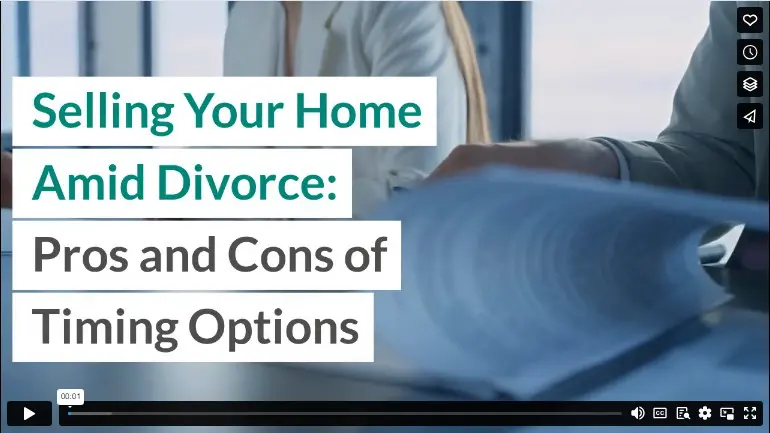Of all the decisions you make during a divorce, determining the future of your home feels the most personal. Figuring out who, if anyone, gets to keep your home and when you should list it is the first step toward your new beginning. As you stare down your future, it is good to know exactly what your options are and what you can expect.
Every situation presents a unique scenario with an endless amount of variables. Kids, finances, and personal opinions are all important factors. Divorce can be a time of heightened emotions. The best approach is to educate yourself, set realistic expectations, and allow yourself to dream about the future.
You will be more prepared by understanding some basics of selling your home during a divorce. However, you decide to proceed, your home is a larger piece of the divorce puzzle. Whether you choose, “I want to sell my house for cash quickly,” or you want to keep the home for the kids, you have many options. When both people approach the decision with an informed and realistic perspective, reaching an agreement will be much easier.
Before you take to Google and type “sell house divorce,” start here. Consider this your first step in learning about selling your home in a divorce.
Who Gets the House?
The first order of business is deciding who, if anyone, gets the house. This will be an emotion-filled and personal decision. Many couples center this decision around stability for children, but that doesn’t have to be the only factor. It may be an easy decision if only one person wants to stay, or it could come down to who has the financial resources to stay in the home.
To Keep or to Sell?
The decision to keep or sell often comes down to finances. Sometimes, selling is the obvious choice. Other times, divorce forces people into selling a very loved and cherished home. Even if one person keeps the home, it usually involves a buy-out from the other and a refinance transaction. In some way, shape, or form, you will typically almost always sell a home in a divorce.
If someone wants to stay in the home, they must be able to afford it. Many couples rely on two salaries to make the mortgage payment. This means keeping the house is not an option financially. In this instance, you must sell the home.
To keep the home, one person will need to be able to afford the remaining mortgage. In addition, they will need to qualify to refinance the loan into their own name and pay the other person for their share of the equity.
When to Sell?
If you decide to sell, the next step is figuring out when. Often, this comes down to how well both people work together and how much the courts need to be involved.
Before the Divorce
Getting your home sold before proceeding with a formal divorce is generally the easiest option. Rather than negotiating joint debt (your mortgage), you will be dividing the cash proceeds from the sale and taking advantage of tax breaks for married couples.
Pros
- Selling before a divorce will make the transaction easier, with less chance of getting held up.
- By selling, you are liquidating assets so both people have the cash to fund their new living arrangements.
- Selling as a married couple has potential tax advantages.
Cons
- This option can delay divorce proceedings as the home sits on the market.
- A quick sale can feel like a sudden and disruptive change for children.
- Both people will need to agree on how to split the proceeds.
During the Divorce
People are often overwhelmed by trying to split the proceeds fairly or need help working together through a major transaction. In this instance, it can be best to sell as a part of your divorce proceedings. This gives you the advantage of negotiating the sale through your lawyers, knowing you have a fair voice in the process.
Pros
- Lawyers will handle the negotiations, provide expert advice, and communicate on their client’s behalf.
- Waiting to sell gives everyone more time to settle their new living arrangements.
- Selling during a divorce can provide court oversight if needed.
Cons
- Involving lawyers will increase the cost of your divorce.
- You may lose the capital gains tax advantages for married couples.
- A contentious divorce can lead to a court-ordered sale, resulting in the loss of decision-making power.
After the Divorce
Occasionally, a scenario plays out where both parties agree to sell the house in the future. One person will occupy the house with the children with plans to sell once the youngest child graduates from high school. You will sell the house on a predetermined date, and both people will split the equity.
Pros
- Both people will benefit from the equity growth while they continue to co-own.
- Children benefit from a stable environment amid their parent’s divorce.
- Holding onto the home allows time to develop a long-term plan for both parents.
Cons
- Waiting to sell ties both spouses together financially until the sale is complete.
- A transaction after a divorce subjects you to a lower capital gains threshold.
- When it comes time to sell, the person occupying the house can carry an uneven responsibility for preparing the home.
You have an entire life to live on the other side of divorce. If you prefer to get through it quickly, consider selling to a real estate investor. While you won’t get top dollar for your home, you will get a quick transaction. An investor will eliminate the stress of handling upgrades and repairs, listing your home for sale, managing showings, and navigating a sales contract. You can wrap up the whole transaction quickly and easily to begin your new chapter.
Video

Infographic
When going through a divorce, deciding the fate of your home is personal. Understanding your options and what to expect is crucial. Cooperation between both parties and court involvement often determine the outcome. You can find more information in the following infographic.



